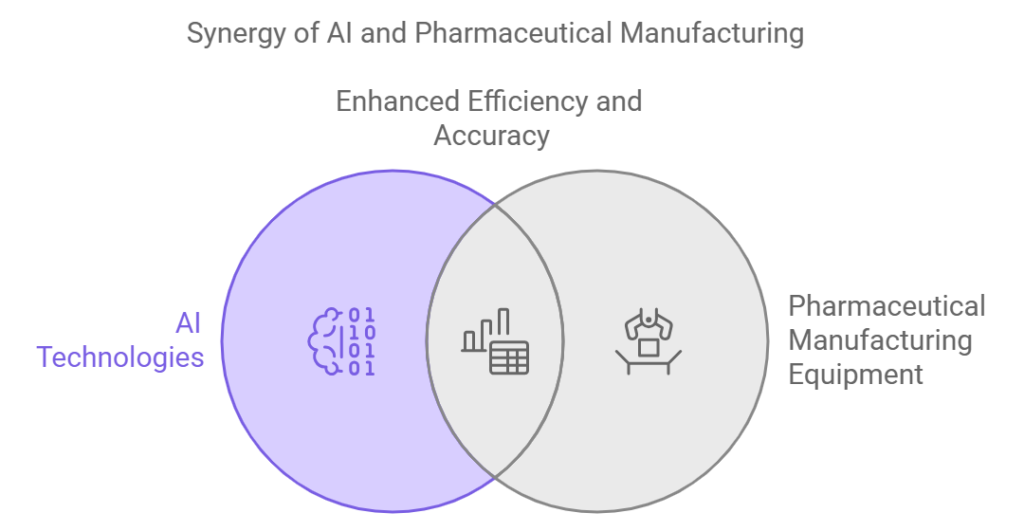The pharmaceutical industry has always been at the forefront of innovation, and the integration of Artificial Intelligence (AI) into manufacturing equipment is propelling the sector into a new era of efficiency, precision, and quality. AI-powered pharmaceutical manufacturing equipment is reshaping how drugs are produced, ensuring that companies can meet growing global reducing human error, and providing real-time insights. In pharmaceutical manufacturing, these capabilities are particularly valuable, as they address key challenges such as process inefficiencies, high costs, and compliance with regulatory requirements.

Growing global demand for generics, rising necessity for adoption of flexible pharmaceutical manufacturing practices, rising potential of pharmaceutical manufacturing infrastructure worldwide, and growing implementation of government schemes and regulatory frameworks for quality assurance are some of the major factors driving the Pharmaceutical Manufacturing Equipment market growth globally.
AI-driven manufacturing equipment leverages technologies such as machine learning, computer vision, and natural language processing to optimize every stage of production, from raw material handling to final product packaging. This integration results in a streamlined workflow that maximizes productivity and minimizes waste.
Applications of AI in Pharmaceutical Equipment
- Process Optimization
AI enables predictive modeling and real-time monitoring to optimize manufacturing processes. Advanced algorithms can analyze data from sensors embedded in manufacturing equipment to adjust parameters such as temperature, pressure, and mixing times, ensuring consistent quality across batches. - Quality Control and Assurance
AI-powered equipment equipped with computer vision systems can detect defects or irregularities at a microscopic level. For example, during tablet production, these systems can identify anomalies such as cracks, uneven coatings, or incorrect dimensions, reducing the likelihood of defective products reaching the market. - Predictive Maintenance
AI facilitates predictive maintenance by monitoring equipment health and identifying potential issues before they cause downtime. By analyzing vibration patterns, temperature fluctuations, and historical performance data, AI can recommend proactive maintenance schedules, extending the lifespan of expensive machinery and avoiding costly disruptions. - Supply Chain Integration
AI helps synchronize manufacturing equipment with supply chain systems, ensuring that raw materials are available precisely when needed. This reduces storage costs and prevents production delays caused by material shortages.
Advantages of AI-Driven Equipment
- Increased Efficiency
AI-powered automation significantly accelerates manufacturing processes. By reducing manual intervention, companies can produce higher volumes of drugs in shorter timeframes. - Enhanced Product Quality
With continuous monitoring and precision control, AI ensures that every product meets stringent quality standards, improving patient safety and reducing recalls. - Cost Savings
While the initial investment in AI-driven equipment can be substantial, the long-term savings are significant. Lower operational costs, reduced waste, and minimal downtime contribute to a more sustainable manufacturing process. - Regulatory Compliance
AI systems can assist in maintaining compliance by generating comprehensive documentation and ensuring adherence to Good Manufacturing Practices (GMP).
Challenges and Considerations
Despite its potential, the adoption of AI in pharmaceutical manufacturing is not without challenges. These include:
- High Implementation Costs: The initial investment in AI-powered equipment and training can be prohibitive for smaller companies.
- Data Security Concerns: As AI systems rely on large volumes of data, ensuring the security and privacy of sensitive information is critical.
- Regulatory Uncertainty: Regulatory frameworks for AI applications in pharmaceuticals are still evolving, creating uncertainty for manufacturers.
The Future of AI in Pharmaceutical Manufacturing
The role of AI in pharmaceutical manufacturing equipment is expected to grow significantly in the coming years. Emerging technologies like edge AI, digital twins, and quantum computing promise even greater efficiencies and insights. Furthermore, as regulatory bodies develop clearer guidelines for AI adoption, the industry is likely to see a surge in innovation and collaboration.
By embracing AI-driven equipment, pharmaceutical manufacturers can achieve a competitive edge, not only by producing drugs faster and more efficiently but also by delivering higher quality and safer products to patients worldwide.
In conclusion, AI is transforming pharmaceutical manufacturing from a labor-intensive process to a data-driven, highly efficient operation. The integration of intelligent systems into manufacturing equipment marks a pivotal step toward a future where precision, speed, and sustainability define the industry.
